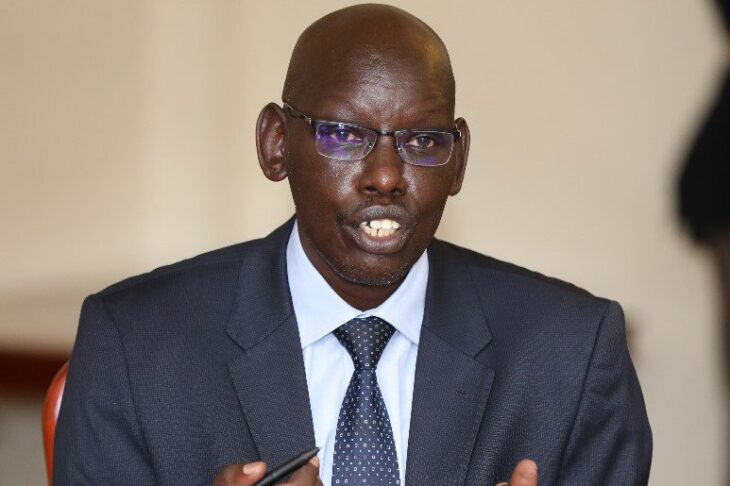NAIROBI, Kenya, Nov, 2 – Dr Belio Kipsang is set for a grand return to the Ministry of Education after president William Ruto nominated him as Principal Secretary State Department For Basic Education.
Kipsang had previously served there during former president Uhuru Kenyatta’s government for nearly eight years.
He was ultimately moved to the State Department for Regional and Northern Corridor Development in changes instituted under the previous regime in what was termed as portfolio re-assignment and changes in the senior ranks of the executive.
His return to the ministry coincides with president William Ruto’s directives to reform the Education sector.
Already, a taskforce to review the country’s state of education, particularly the implementation of the Competency-Based Curriculum (CBC), is moving across the country to seek the view of Kenyans.
The 42-member taskforce will also deliberate and review the state of basic education, technical and university education.
In the gazette notice, Prof Raphael Munavu will be chairing the taskforce.
“The working party shall invite and consider views from sector stakeholders and members of the public, hold such number of meetings in places and at such times as it shall consider for the proper discharge of its functions,” directed President Ruto.
According to the gazette notice, the taskforce is expected to issue a process report every two months to the head of state before finally presenting its final report in six months’ time.
On Basic Education, the taskforce will be required to cause and undertake a summative evaluation of the competency-based curriculum, assess and recommend an appropriate structure to implement the competency-based curriculum, study all laws governing the basic education sub-sector, and make recommendations for review of these legislations with a view to addressing duplication, ambiguities, efficiency constraints and improving linkages.
The taskforce will also be expected to study, assess, and make recommendations on, the conceptualization and implementation of key tenets guiding the competency-based approach including but not limited to value-based education, community service learning, parental empowerment, and engagement.
“The assessment and examination framework, the quality assurance and standards framework, the teacher education and training framework for both pre-service and in-service, the teacher deployment framework, the technology for curriculum delivery, improved learning outcomes and education management, the governance mechanisms of learning institutions and sharing of resources across schools and TVET institutions to ensure maximum utilization of public resources for improved learning outcomes,”
“The public school categorization policies and implications on access, transition, and cost, to review and recommend appropriate financing framework including capitation and minimum essential package grants for all levels of basic education, to review and recommend equitable access to education, especially for those facing social, economic and geographic marginalization, vulnerable populations, children and persons with special needs, to review and recommend appropriate framework on the management and coordination of bursaries and scholarships for secondary school students,” read the gazette notice.
They are also expected to review and recommend a framework for physical and e-infrastructure development and coordination of public-private. Also, review partnerships for improved access and quality provision; and review and recommend a tracking system to capture and enroll children of school age to ensure universal access to pre-primary, primary, and secondary education.
On Tertiary And University Education
The taskforce will also be expected to review and recommend a governance and financing framework for TVET training and development, university education, research, and training,
“To study all laws governing the tertiary education subsector and make recommendations for review of these legislations with a view to streamlining effectiveness and efficiency in the subsector, to recommend a framework of operationalizing the National Open University of Kenya and a framework on Open, Distance and E-line learning (ODEL),” read the gazette notice.
Also, to make recommendations for streamlining continuity in TVET and university education transition, to review and recommend legislation to facilitate the amalgamation of HELB, TVET, and University Funding Boards with a view of harmonizing and merging all tertiary education funding entities.
Dr. Kipsang Tenure In the Ministry Of Education Under Former President Kenyatta
As the Principal Accounting officer, Kipsang’ has served in his position under four different Cabinet secretaries including; Prof. Jacob Kaimenyi, Dr. Fred Matiang’i, Amb. Amina Mohammed and the current Education CS Prof. George Magoha.
During this time, Kipsang’ is considered to be one of the brains behind the wide ray of reforms in the education sector and further tasked with their implementation.
The PS was part of the team that supervised among other reforms, the controversial laptop project deemed by the Jubilee government as one that would usher learners into the 21st-century digital world.
The establishment and operationalization of the National Education Management Information System (NEMIS), the establishment of day wings in boarding schools, gradually increased capitation for learners in primary and secondary schools, waiver of examination fees, efficiency in the administering of national examinations, announcing results and placement of learners.
The most significant reform of which Kipsang was also a crucial part was the rollout and implementation of the Competency-Based Curriculum (CBC) which favors a continuous assessment as opposed to a national examination championed by the 8-4-4 system.
Want to send us a story? Contact Shahidi News Tel: +254115512797 (Mobile & WhatsApp)


